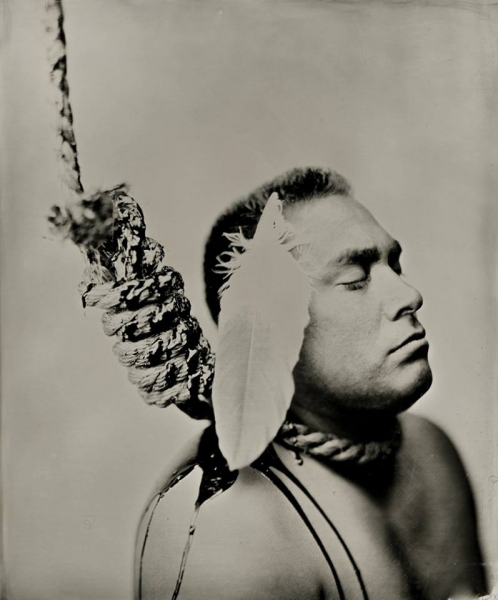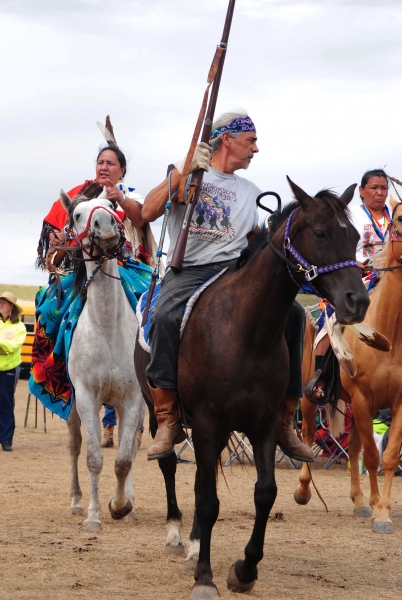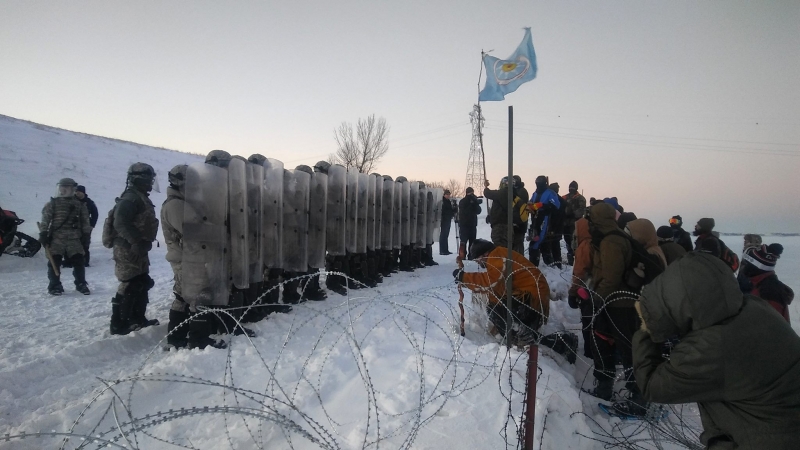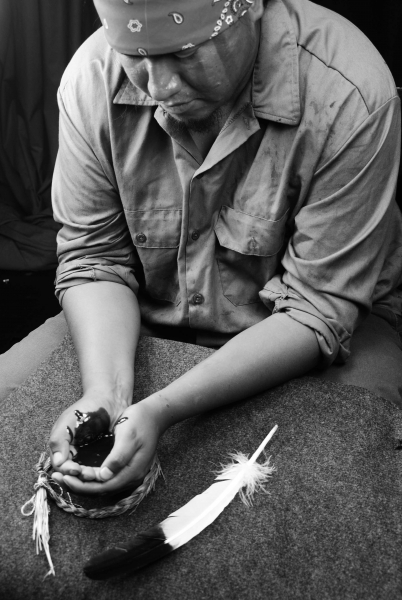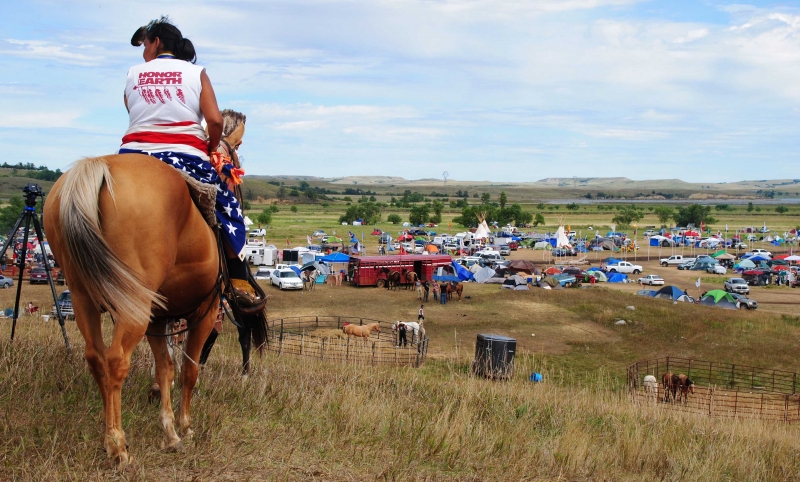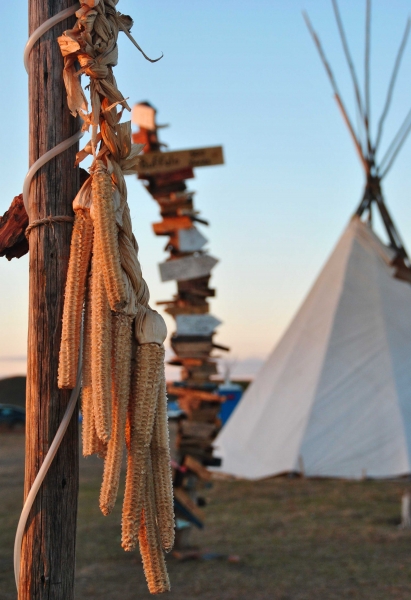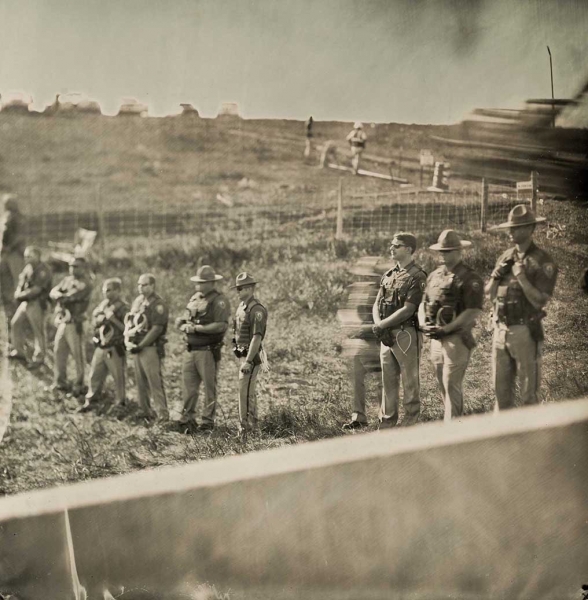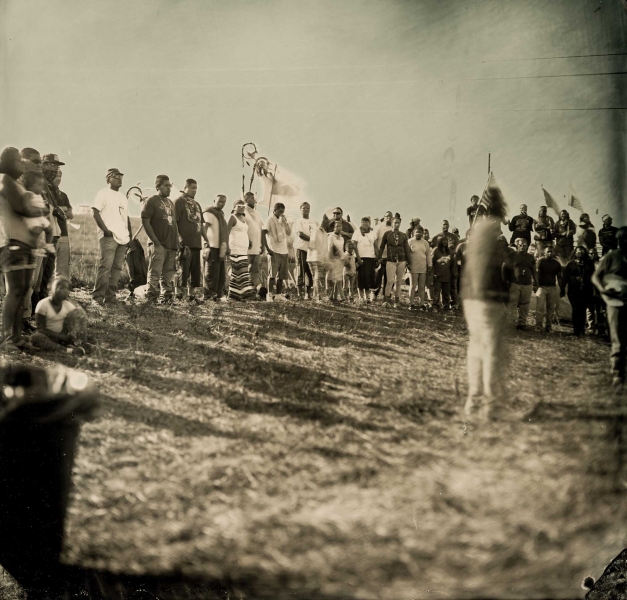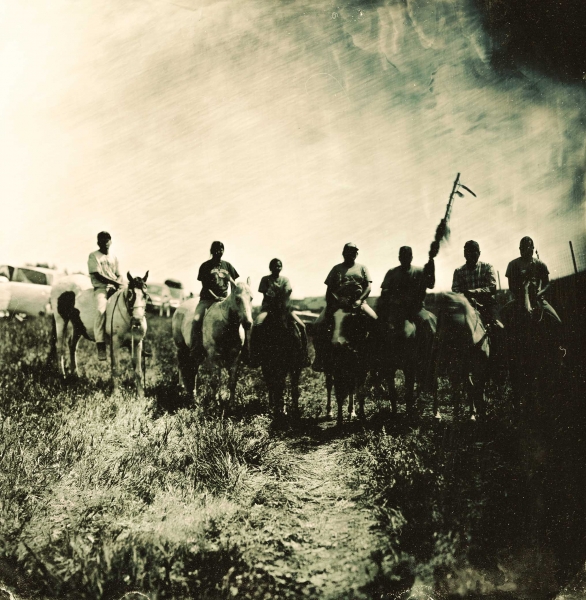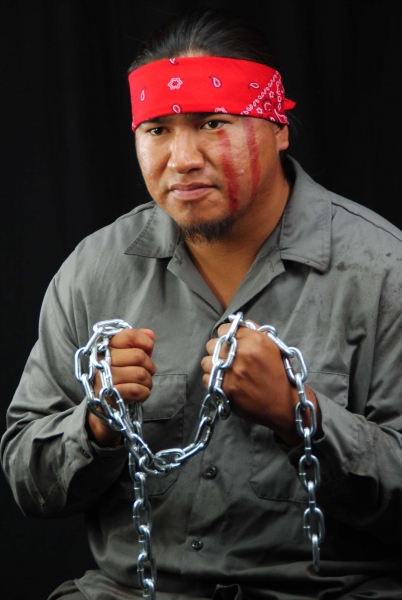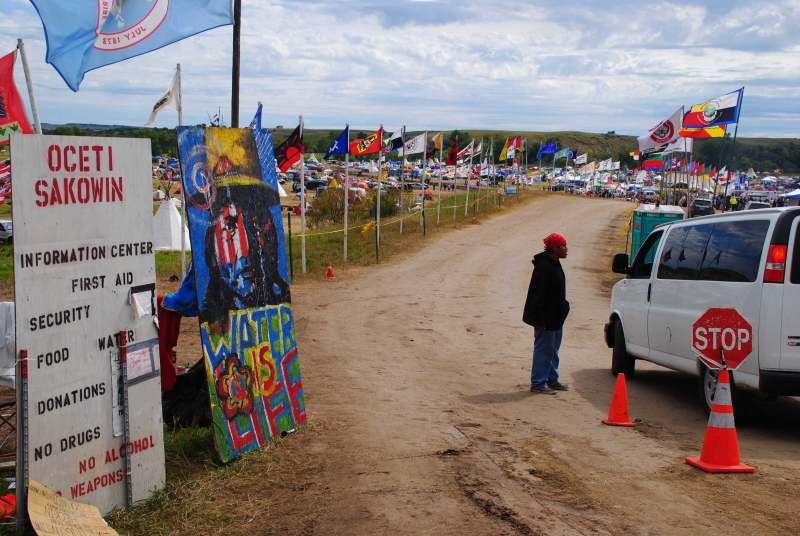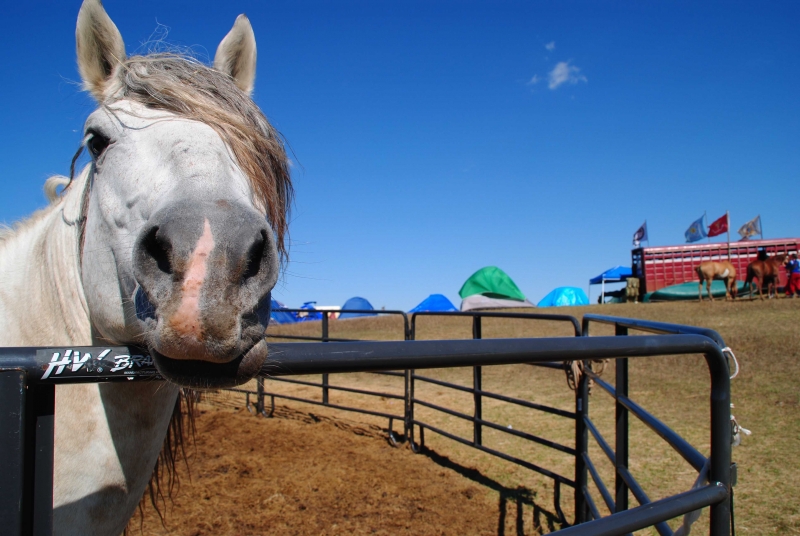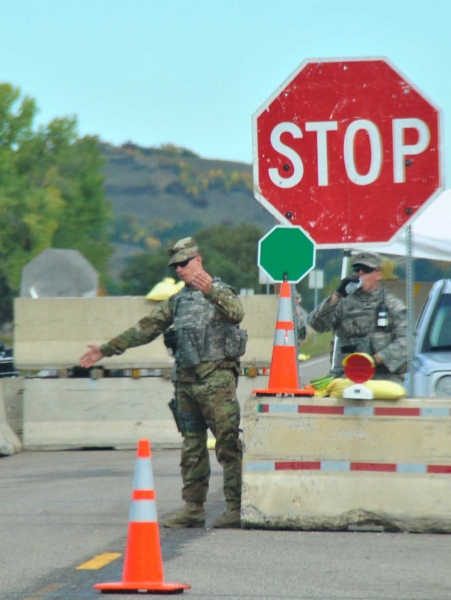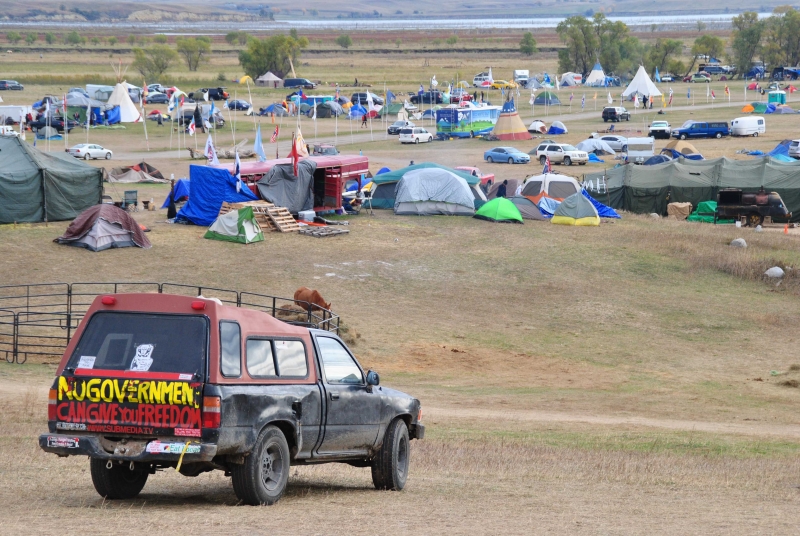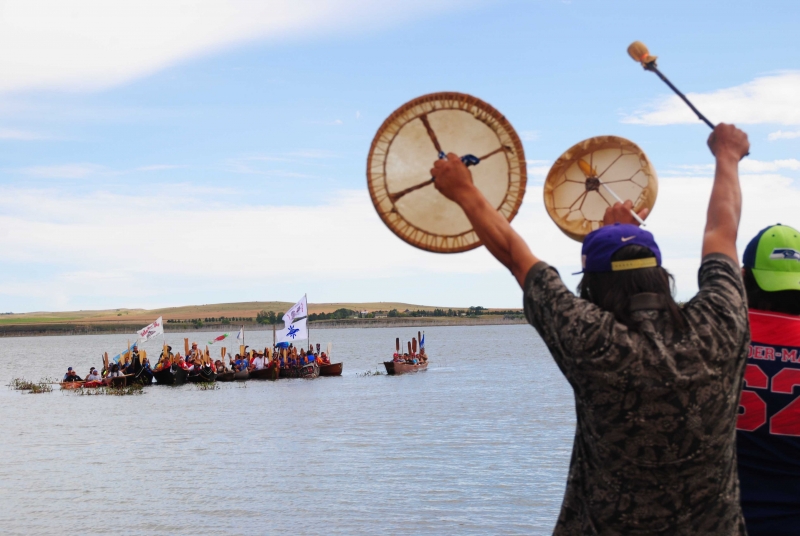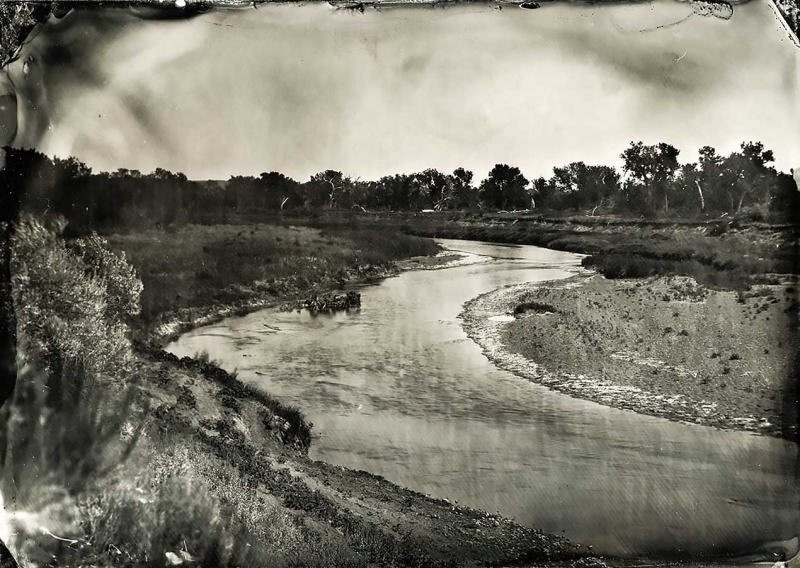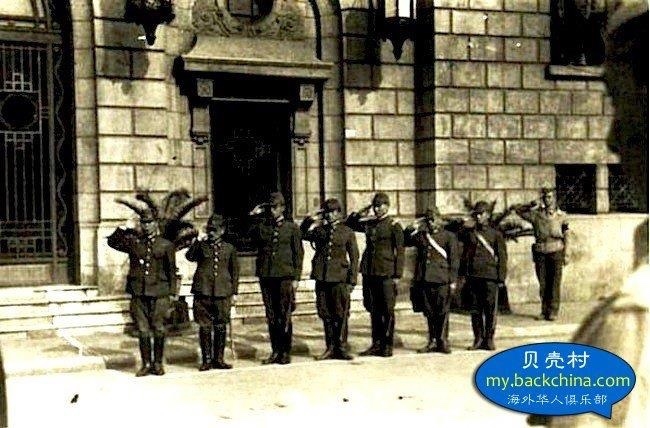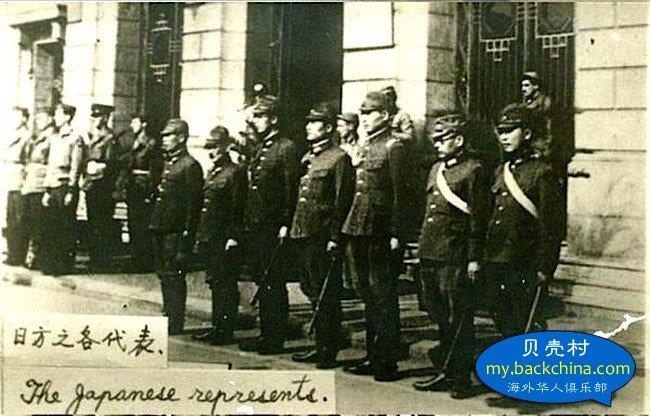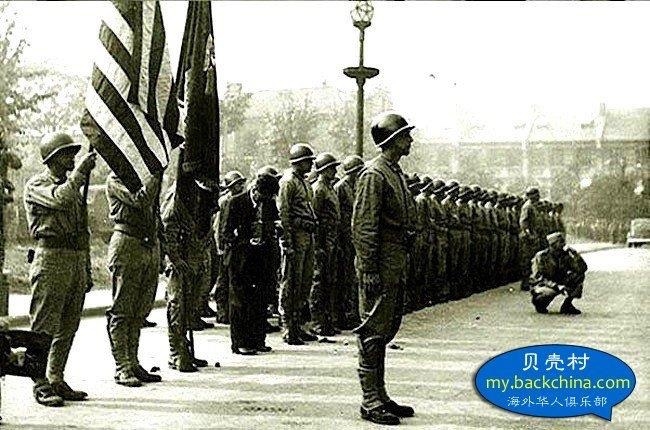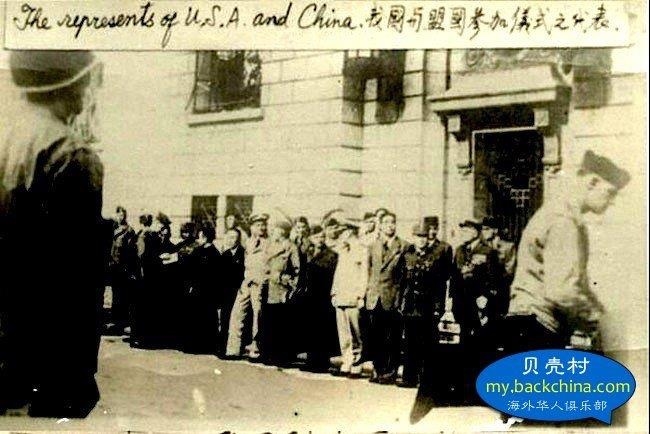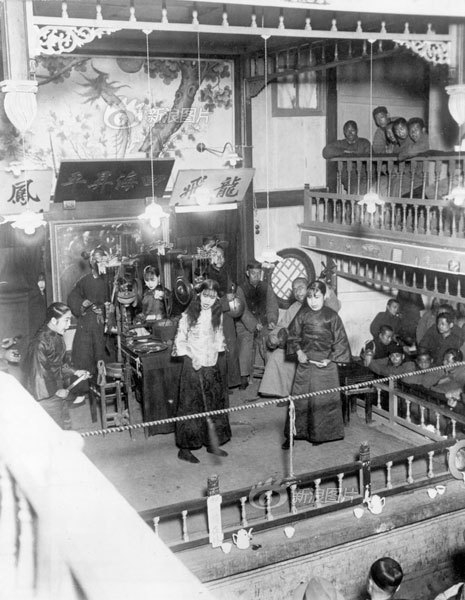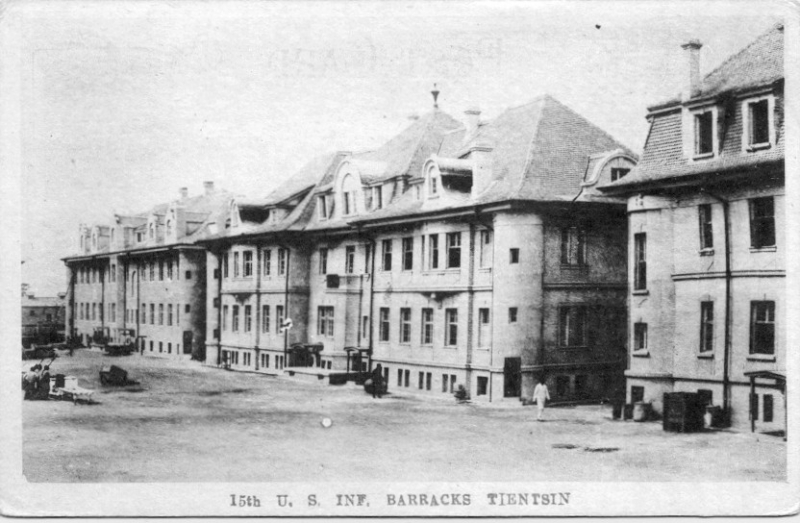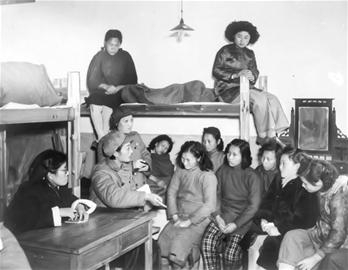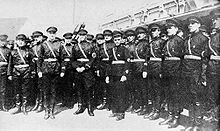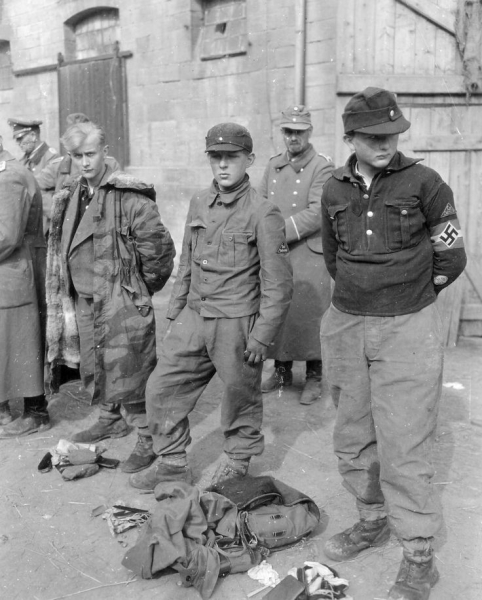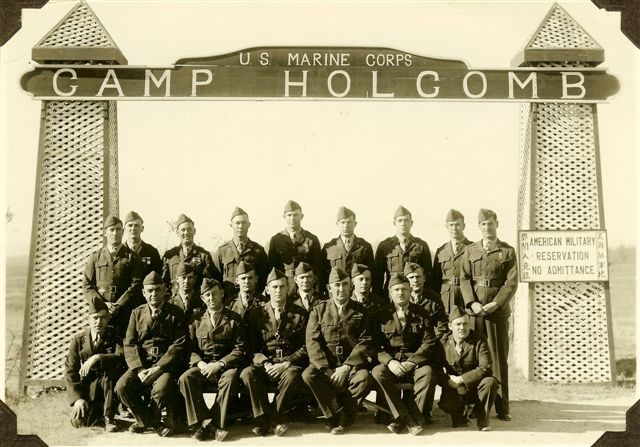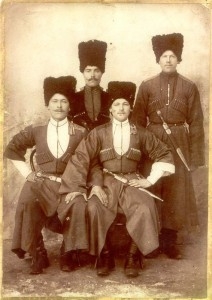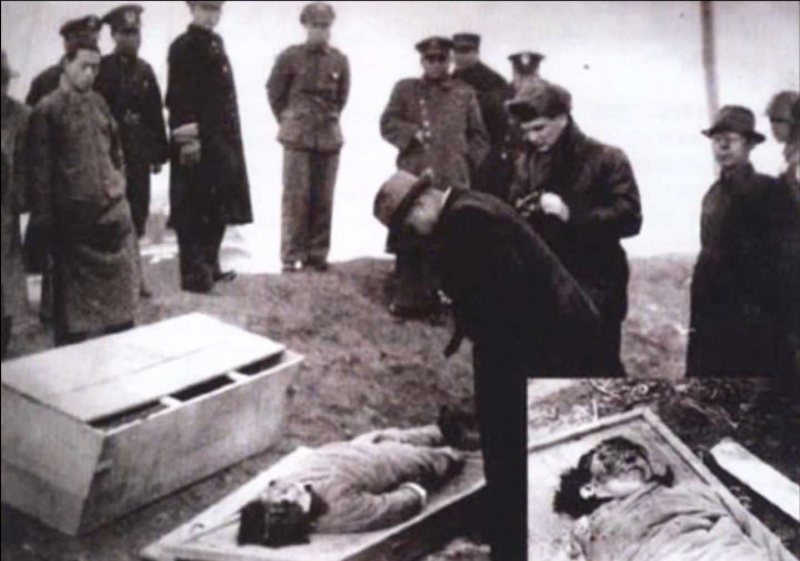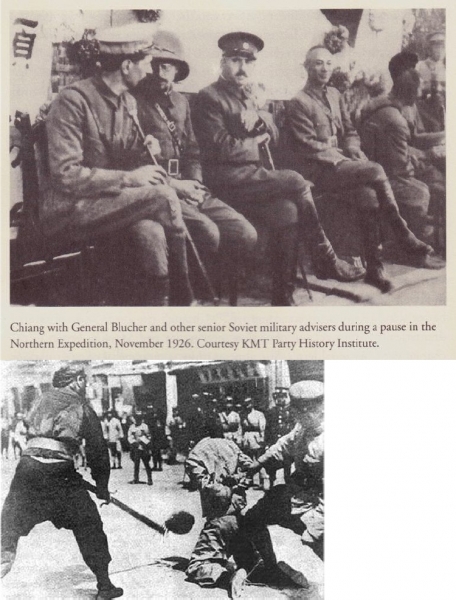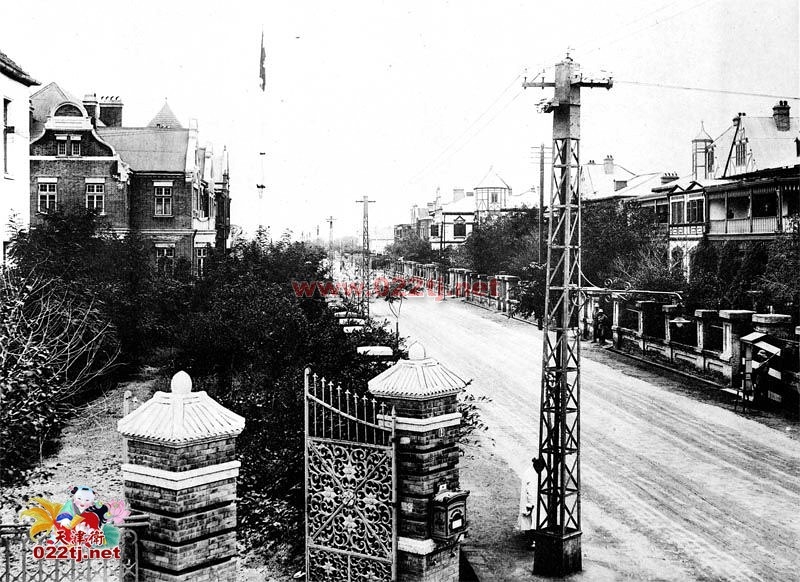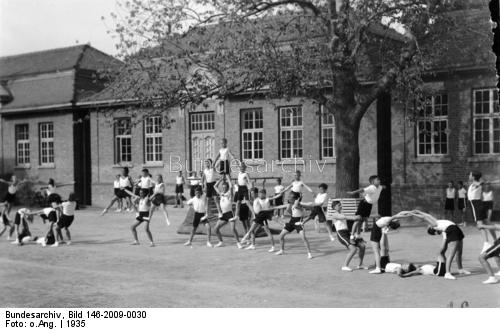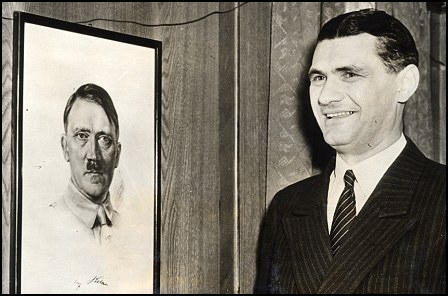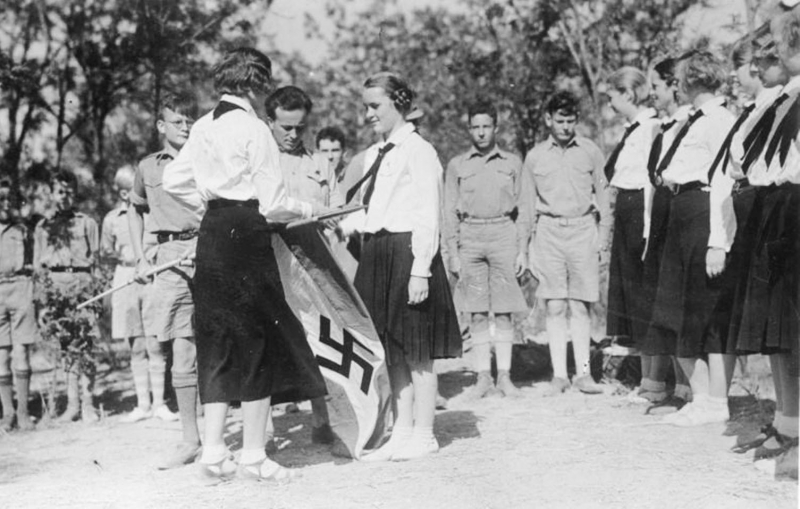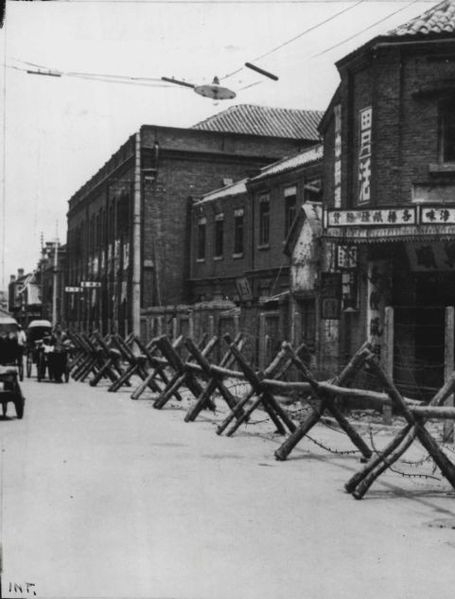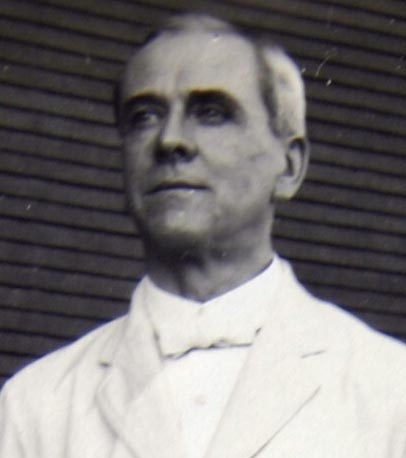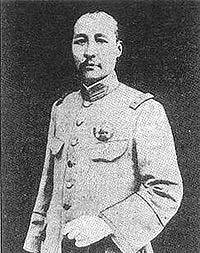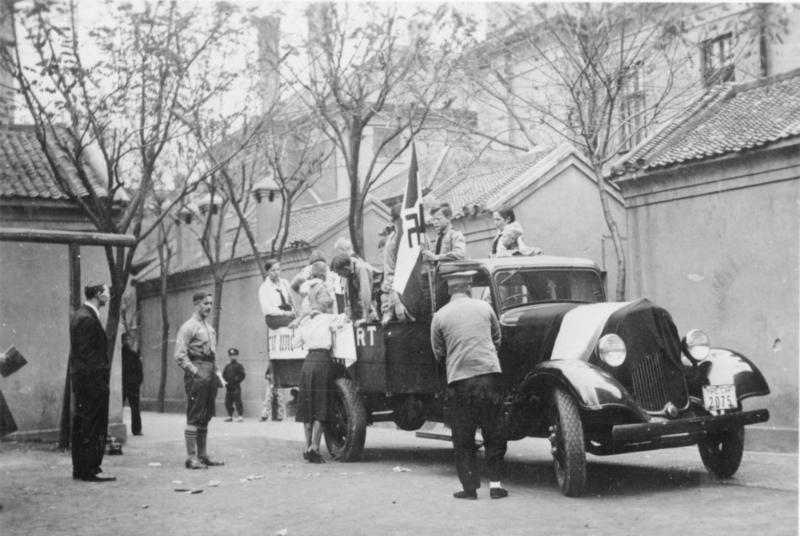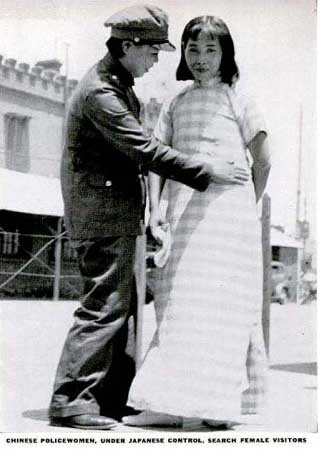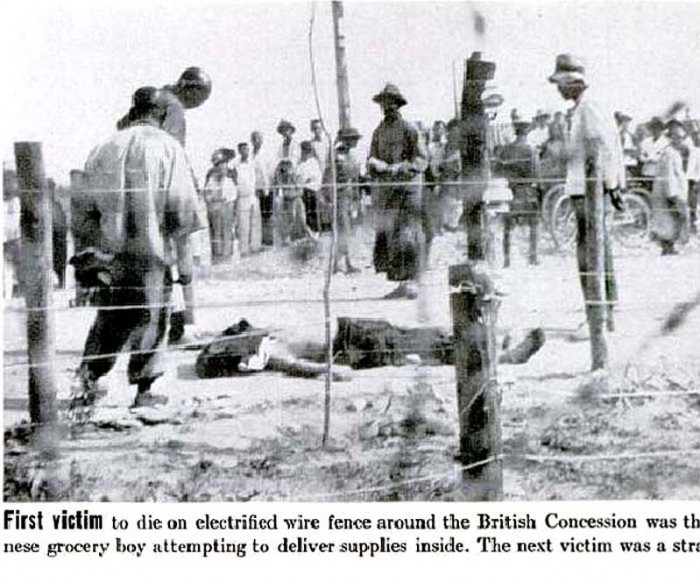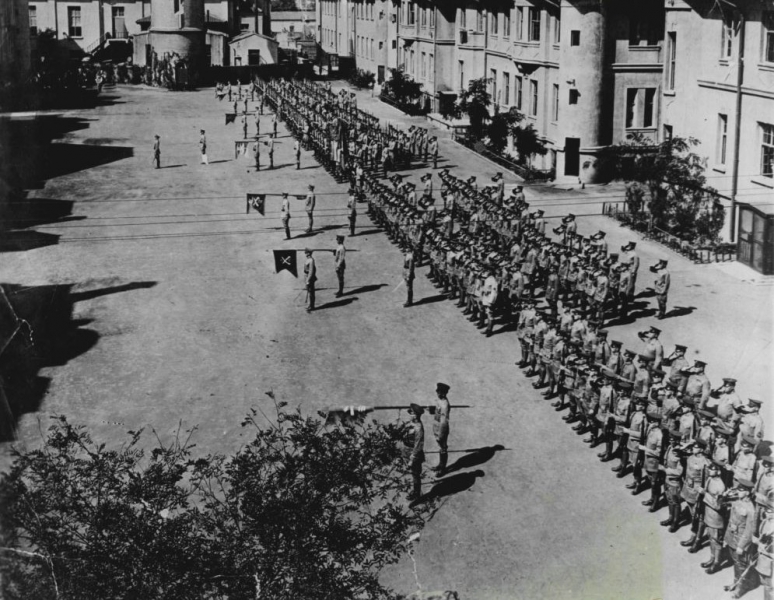Morton County Sheriff’s Department Kyle Kirchmeier vs. Standing Rock Sioux Tribe Chairman Dave Archambault II
By C.S. Hagen
MANDAN, ND – Two North Dakotan chiefs are pitted, one against the other.
One chief, Morton County Sheriff Kyle Kirchmeier, has laws, politicians, the North Dakota National Guard, taxpayers’ money, and a third chief from the private sector, Kelcy Warren, CEO of Energy Transfer Partners, with all the powers money can buy, on his side.
The other, Standing Rock Sioux Tribe Chairman Dave Archambault II, uses prayer, donations, federal treaties, and thousands of volunteers from native tribes and concerned citizens across the world to fight the pipeline’s continuation.
One chief uses the law’s full force: police in riot gear, automatic weapons, handcuffs, and calls the Dakota Access Pipeline demonstrations, which have continued in earnest and unabated since early August, dangerous. The other chief calls for prayer, civil disobedience, smokes a ceremonial peace pipe, and calls his people, including those from nearly 300 different tribes, water protectors.
One chief lives in Mandan, making USD 78,000 a year; the other sometimes resides in a canvas tipi on land that once belonged to the Great Sioux Nation.
One chief arrested the other. In fact, Archambault was among the first activists to be arrested on August 12, 2016, according to the Morton County Sheriff’s Department. But to Archambault, the fight against Dakota Access Pipeline is just.
“Our tribe has opposed the Dakota Access pipeline since we first learned about it in 2014,” Archambault said in a press conference. “I believe this movement is organic, and has a life on its own. It is not about race, not about hate. It’s about unity.”
For 500 years, Archambault said, Native Americans have suffered from defeat, prejudice, and broken treaties. One day, the pipeline will not only poison the Standing Rock Sioux tribe, but the millions who depend on the Missouri River for water – human, fauna, and flora.
“And yet we’re the ones who continue to pay the costs,” Archambault said.

Buffalo drinking from pond near the proposed Dakota Access Pipeline – photo by C.S. Hagen
The costs including but not limited to the pipeline tearing up native burial sites, poisoning land and waters on its journey south toward Nederland, Texas, in the same state where the third chief resides in 23,000-square-foot-home on 10 acres of land. The real costs to the personal freedoms of at least 69 activists arrested, some of whom are banned from returning to protest areas. Misdemeanor offenses of trespassing are now becoming felony charges of criminal mischief, according to the Morton County Sheriff’s Department. Some of those arrested, activists said, are being stalled, and temporarily denied their rights to counsel.
“The biggest concern that we had about those situations, was holding someone on a no-bond hold for three days on a misdemeanor, that seems irrational,” Standing Rock Sioux Tribe camp attorney Angela Bibens said. “The situation is that people are being targeted, people’s relatives are being targeted. Are people’s rights being violated? There is definitely a case for that.”
Sara Long, a citizen journalist, was arrested for trespassing on Sunday. She had her phone confiscated, was abused verbally, and law enforcement threatened to have her phone unlocked with software, Bibens said.
“You have to have a warrant to get into someone’s phone,” Bibens said. “That is a clear case of someone’s rights being violated. All charges against Long were eventually dropped, and Long did receive her cellular phone back, Bibens said.
“People are being arrested indiscriminately. They are trying to target leadership, trying to determine who is in charge. There is a certain amount of panic that is detectable within law enforcement. They’re not accustomed to what they’re seeing, a large, peaceful group of Native Americans – everybody’s here in Standing Rock.”
Bibens was denied one-on-one access to activists in the county jail, she said, and has to speak to them through glass and by telephones, which may be recorded, she said. Licensed to practice in Colorado, and currently with the National Lawyers Guild, it is legal for out-of-state attorneys to be denied the right to practice in another state, but the current situation with 69 arrests is overwhelming, not only for her, but for Morton County.
Some are being appointed court attorneys, and she is attempting to recruit local lawyers to step in.
Additionally, activists have reported seeing military research and surveillance drones, claiming the drones have blocked reception to the Standing Rock camp areas, and that Facebook is blocking some activists’ videos and statements. Bibens is monitoring the claims, she said.
Not long after the Standing Rock Sioux Tribe’s petition for an injunction against Dakota Access failed, President Obama’s Administration and the U.S. Army Corps of Engineers issued a statement recommending Dakota Access LLC was no longer authorized to work on the U.S. Corps of Engineers’ lands. On Friday, the Washington D.C. Circuit Court of Appeals officially backed the President’s recommendation, halting all work on the Dakota Access Pipeline within 20 miles on either side of Lake Oahe along the Missouri River. The news was joyous to some, considered an annoyance to others. With a legal score of one-to-one for both chiefs, some expected the tension – like a ticking time bomb – would be defused.
Instead, tensions grew.
Law enforcement began arresting activists, native spokespeople, and media personnel, by the busloads. Misdemeanor criminal trespass charges have been filed against Democracy Now! host Amy Goodman, the Standing Rock Sioux Tribe’s Red Warrior spokesman Cody Hall, at least two other journalists, and third-party presidential candidate Dr. Jill Stein, as well as her running mate, Ajamu Baraka.

Dale “Happi” Americanhorse Jr. while chained to a Dakota Access excavator – online sources
“The Morton County State’s Attorney’s office will pursue felony charges against the protestors who attached themselves to equipment due to the seriousness of the crime,” Kirchmeier said. “The Dakota Access Pipeline has shown good faith in the legal process by removing their equipment from their worksites… But rather than respect this, a small element of the protest group has decided to go and find DAPL equipment and sites wherever they are and interrupt their work that the pipeline has legal right to conduct.”
“This is an unacceptable violation of freedom of the press,” Goodman said in a statement. “I was doing my job by covering pipeline guards unleashing dogs and pepper spray on Native American protestors.”
Long, who is a resident of Cannon Ball, said on her Facebook page that she was incarcerated for 28 hours and charged with criminal trespass.
“They are trying to silence us, again and again, by violating our rights,” Long said on her Facebook page.
“It was not known at the time that Ms. Goodman was a media representative,” Kirchmeier said. “Part of the investigation process is to review all evidence. This included video taken from the protest site. Persons identified on the video were arrested.”
All activists arrested, excluding one female prisoner who had an outstanding warrant from Nebraska, have been released on bail, Kirchmeier reported. Olowan Sara Martinez was charged with criminal trespass on a Dakota Access Pipeline worksite, and has outstanding warrants of terroristic threats, a class-4 felony, among other misdemeanor charges from Nebraska. Nebraska officials have 10 days to take custody of Martinez, according to Morton County Sheriff’s Department.
Kirchmeier denied any accusations that the department was targeting media personnel, spokespeople, or medics.
“There are numerous outside groups, some invited and some not,” Kirchmeier said. “They are participating and are suspected to be causing issues. While they may have come in support of the Standing Rock Sioux Tribe, they are also pushing their own agenda.”

North Dakota National Guard blockading Highway 1806 – photo by Annie Gao
Many activists feel local and state law enforcement, and now the North Dakota National Guard, are acting as the protectors of big oil interests. While native interests rarely make national or international headlines, and their opinions on matters are rarely heard, these ingredients add to the distrust shared by nearly all Native Americans toward the federal and local governments, activists said. Throw in a pinch of big oil campaign funding for North Dakota politicians, a little private investing, and the final result resembles an agenda the Standing Rock Sioux Tribe and its supporters are not comfortable with.
The third chief, Warren, vowed to his employees to complete the 1,172-mile pipeline on time. The pipeline, if built, will “safely move American oil to American markets,” Warren stated in an internal memo to Energy Transfer employees. “It will reduce our dependence on oil from unstable regions of the world and drive down the cost of petroleum products for American industry and consumers.”

DAPL excavation equipment and “scar” or trench made for the pipeline – photo by C.S. Hagen
An interesting and profitable venture, analysts say, especially in light of the fact that Congress agreed to lift the nation’s 40-year-old ban on oil exports in 2015. Fourth quarter 2015 the United States exported 4.8 million barrels per day to 136 countries, including Canada, Saudi Arabia, Venezuela, Mexico, and Colombia, according to the U.S. Energy Information Administration.
“It’s entirely fair to highlight Energy Transfer Partner’s ambitions when it comes to exporting hydrocarbons from North America to the highest bidder, and to tie that to a recent lifting of embargo,” Hugh MacMillan, a senior research for the Food & Water Watch said.
Senator Heidi Heitkamp D-N.D., helped lead the efforts on behalf of oil companies for increased exports of liquefied gas and crude oil, according to Heitkamp’s website. Heitkamp, along with Senator Lisa Murkowski R-AK, wrote the Heitkamp-Murkowski Bipartisan Bill to lift the ban on oil exports in 2015.
Enbridge Inc., an investor of the Dakota Access Pipeline, stated in its 2015 annual report that “We see continued opportunities to expand and extend our pipeline systems to help meet North America’s energy needs and contribute to energy security, as well as build connectivity to coastal markets than enable exports.”
No matter what country Dakota crude from the Bakken region might end up, Warren petitioned employees to contact “elected representatives – all of them – to tell them how important this project is to your livelihood.”
Work on the pipeline is approximately 60 percent complete, Warren stated.
“Our corporate mindset has long been to keep our head down and do our work,” Warren’s memo stated. “We respect the constitutional right of all assembled in North Dakota to voice their opinions for or against projects like ours. However, threats and attacks on our employees, their families and our contractors as well as the destruction of equipment and encroachment on private property must not be tolerated.”

The day of the attack dogs – photo provided by Morton County Sheriff’s Department
Frost Kennels
According to Archambault, activists did not instigate the violence on September 3.
“They provoked everything that happened,” Archambault said in a press conference.
Bob Frost, owner and president of Ohio-based Frost Kennels, said his employees were at the Dakota Access Pipeline site on September 3.
“We went out there to do a job and we did it,” Frost said. Personally, Frost supports the continuation of the Dakota Access Pipeline, and said when activists held a protest in Louisville, Ohio last weekend, he received death threats. Activists also attempted to break into an employee’s home, Frost said. Police arrived and the activists scattered; no one was arrested. Frost also reported that activists were burning Dakota Access Pipeline bridges in the Cannon Ball area, but Morton County Sheriff’s Department stated they received no such reports.
 Frost’s company didn’t have time to prepare properly on September 3, and they “were ambushed,” he said. The plan was to use pronged collars and 20-foot leashes, but he decided to go early to the construction site after he received a call from the company who employed Frost Kennels, a company he refused to name.
Frost’s company didn’t have time to prepare properly on September 3, and they “were ambushed,” he said. The plan was to use pronged collars and 20-foot leashes, but he decided to go early to the construction site after he received a call from the company who employed Frost Kennels, a company he refused to name.
Upon arrival, Frost found activists tearing down fences, throwing themselves under excavation machinery, and threatening his dogs and employees, Frost said.
“So we just said f*ck it, and got our dogs, and tried to make a bridge between them and the workers. We did not go out to attack people, but they knocked down a fence and entered private property. I tell you what, if someone came on to my own yard, I’d have the right to shoot them, that’s the law.”
As to the angry online reactions to pictures of Frost Kennels dogs with bloodied jaws, Frost said the blood could not have come from human beings.
“Dogs aren’t trained to be social around 20 people, especially with that riot mentality,” Frost said. “But if a dog bites you, the blood is gone within 30 seconds, because they lick their lips and it’s gone.” The blood, Frost said, came from his dogs being struck by activists.
Despite the threats Frost has received, he said he offered activists food last weekend during their protest against his company. “I offered to give them all food, but they didn’t want it,” he said. “And hey, I’m not racist. My wife is 50 percent Native American, my kids are card carrying tribal members, and my best friend is a black guy sitting right here beside me.”
At least eight activists, including a young woman were injured, some with dog bites, and one child suffered a rash after being hit in the face with mace, according to Bibens.
“As far as that picture of that child being bit, I feel bad for whoever it was,” Frost said. “First because any child who is bit I feel for, but also I feel bad for the parents who brought their children there in the first place.”
Morton County Sheriff’s Department has not filed charges against Frost or his employees yet, but initiated a joint task force on Tuesday comprised of the Morton and Mercer County Sheriff’s departments, the Bureau of Criminal Investigation, and the Bureau of Indian Affairs, to investigate all sides involved. The North Dakota Private Investigation and Security Board is also investigating whether Frost Kennels was properly licensed or registered to work in the state.
“It is important we give this incident a thorough examination,” Kirchmeier said. “DAPL private security officers with dogs were at the worksite. Protesters broke through a fence and entered the site… Seven individuals have been identified and charged with criminal trespass for their involvement in the protest that day.
“The investigation could lead to charges on both sides.”
Deputies did not know about the use of dogs until receiving a 911 call from security personnel, Kirchmeier said.
Rumors that G4S, one of the world’s leading security companies headquartered in Great Britain, has been hired to provide security staff to Dakota Access Pipeline, are false, according to the company’s communication director Monica Garcia. Garcia said that no G4S personnel were on site on September 3, and that the company has no K9 units in North Dakota yet, and that G4S has had no engagements with activists involved with the Dakota Access Pipeline.
“The incident that occurred near Cannon Ball, North Dakota on Saturday, September 3rd involved other security providers, not G4S,” Garcia said. “We are not providing services to that entity [Dakota Access Pipeline or Energy Transfer Partners].”
The security company goes by many nicknames such as the “Chaos Company” in an April 2014 article for Vanity Fair, and as “spy for hire” in Tim Shorrock’s 2009 book Spies for Hire. Historically, G4S is hired by companies and governments to enter dangerous situations such as Nigeria, Israel, Colombia, Iraq, Afghanistan, and now, according to media outlets around the world, into western North Dakota.
The company and its subsidiaries are allegedly involved in controversies including immigrant-detainee labor in prisons, crimes against humanity in Israel, misconduct in child custodial institutions, police telephone data manipulation, and its employment of terrorist Omar Mateen, who killed 49 people and wounded 53 others in an Orlando gay nightclub in June 2016, according to Reuters.

A Native American horse inside corral at Big Camp – photo by C.S. Hagen
Winter is Coming
Inside the three camps set up outside Cannon Ball, some activists are winterizing. Solar panels are being used to produce electricity. Sturdier, wooden structures are replacing tents. Woodstoves are being prepared for larger tents that will surround Big Camp’s Sacred Circle. Ceremonies last long into the night, and modern bands have also been performing on the weekends.

Direct Action classes at Big Camp – photo by C.S. Hagen
Although the tension on both sides of the Dakota Access Pipeline may be nearing a breaking point, meetings between the two chiefs, Kirchmeier and Archambault, have “been numerous,” according to Kirchmeier. Morale, for both chiefs, and on both sides of the issue, are high. Big Camp, nestled into a gentle curve of the Missouri River, has expanded. Medic tents have doubled. Classes for children, for activist awareness, for wilderness survival are now being taught to anyone wanting to attend. Jewelers are displaying their wares. Long lines orderly wait for free t-shirts with protect water slogans printed on site. Donations in the forms of clothing, meats, eggs, water, are pouring in. Porta potties are kept clean as possible.
Rock star Neil Young produced a new song and video entitled Indian Givers for the Dakota Access Pipeline protest, according to Rolling Stone magazine.
There’s a battle raging on the sacred land, our brothers and sisters have to take a stand, the song starts off.
Young makes reference to “big money” being the “Indian givers” for plowing an oil pipeline through land rightfully belonging to Native Americans, and sings about Dale “Happi” American Horse Jr., the 26-year-old Sicangu-Oglala Lakota activist who was featured in HPR story entitled “Can’t Drink Oil,” on September 15.
Saw Happy locked to the big machine
They had to cut him loose and you know what that means
That’s when Happy went to jail
Behind big money justice always fails
– part of the lyrics for Neil Young’s song Indian Givers
Kirchmeier realizes the issues will not be resolved anytime soon.
“The morale of our law enforcement personnel is good,” Kirchmeier said. “We have tremendous support from law enforcement agencies across North Dakota.”
A total of 595 people from 51 departments and agencies have assisted, Kirchmeier said. Thirteen counties in North Dakota have provided 144 officers, 11 cities in North Dakota have provided 130 officers, and another 127 officers have been recruited locally.

Medic tent outside of Red Warriors Camp – photo by C.S. Hagen
“Tribal leaders have indicated to law enforcement they want a peaceful protest,” Kirchmeier said. “However, not all protesters have been peaceful. Aggression and actions to incite fear or intimidation are not peaceful activities. Protesters do not have the right to disrupt traffic, close the road, trespass on private property or disrupt other legal activities. They do not have the right to incite fear in the traveling public, local land owners, workers, first responders, or law enforcement.”
Additionally, camps south of the Cannon Ball River will soon be granted a temporary Special Use Permit, which requires a USD 100,000 performance bond, and USD 5,000,000 in insurance, Kirchmeier said. If the Standing Rock Sioux Tribe signs the permit, the U.S. Army Corps of Engineers will countersign and the permit will be valid for 30 days.
Winter is coming, and all chiefs are preparing. One is doubling down on arrests and following the law. The other chief is also using legal maneuvers, and an indomitable spirit Native Americans have not seen since the Battle of the Greasy Grass, 140 years ago. The third chief, perhaps, is grinding his teeth in frustration at the setbacks.
“We have a connection to Mother Earth,” Archambault said. “And it goes to the center of the earth and goes up to into the universe. We are still here, and the reason why we are here is because of our prayers.
“It is all good.”

Activists from South America posing at Big Camp, near Cannon Ball, ND – photo by C.S. Hagen

 “I think things went too far,” Leyla said. After the meeting, both Fargo women wanted to go immediately to Horab & Wentz, CPA, Hensley’s former place of work, to ask the owners to give Hensley’s job back. Hensley was fired Wednesday, one day after the hate crime was committed.
“I think things went too far,” Leyla said. After the meeting, both Fargo women wanted to go immediately to Horab & Wentz, CPA, Hensley’s former place of work, to ask the owners to give Hensley’s job back. Hensley was fired Wednesday, one day after the hate crime was committed.

















